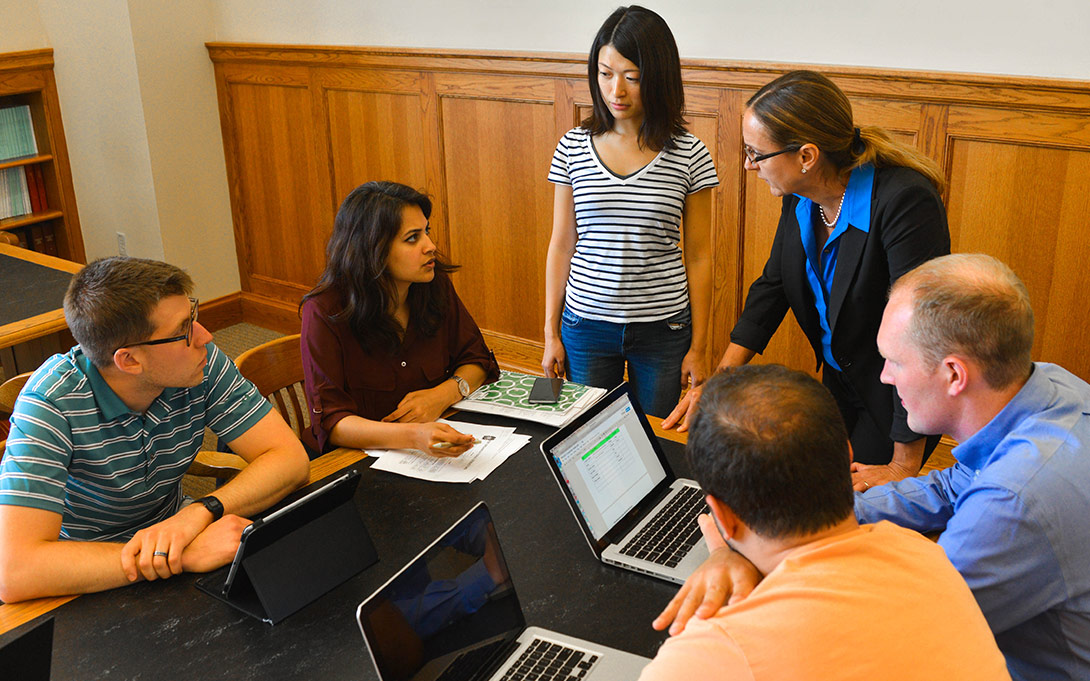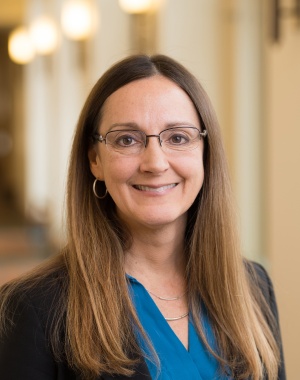
Expert mentors are a distinguishing aspect of Professor Elisabeth Gerber’s Strategic Public Policy Consulting course. The consulting course gives graduate students the opportunity to help clients such as the Government Accountability Office (GAO), the city of Detroit, and other organizations with real needs. Mentors organized through the Program in Practical Policy Engagement (P3E) help the student teams to develop work plans, manage clients, and keep their projects on track.
“There has to be a good balance where we (the mentors) are not overbearing or overwhelming and not trying to second guess what they’re doing,” Larry Good, one of the mentors and president and CEO of Corporation for Skilled Workforce, said. “Rather, we’re a feedback source — the structure seems to hit that right on. They get meaningful input, but not so much that we’re an annoyance in the middle of all the work for them to get done.”
One group, consisting of AJ Convertino (MPP’ 22), Jess Williams (MPP ‘22), Eleanor Pershing (MPP ‘22), and Cassidy Uchman (MPP ‘22), is working for GAO to investigate the special education teacher shortage. The team, mentored by Good, is investigating the causes of and how to solve the special education teacher shortage. Their results will eventually reach Congress.
“Since this is a real-world scenario, it’s very different than doing a project for a class. You have multiple audiences. Normally, when you write a paper for a class, you’re just writing it for that professor even if you’re writing a memo addressed to somebody else — that person is never going to read it,” Convertino explained. “In this case, we are not just writing this for GAO (Government Accountability Office), but we’re writing for them to then present to Congress. So, we’re trying to put them in the best position to fulfill their goals. There are a lot more factors that we need to take into account compared to just writing a paper for class.”
“Because they are real people and real clients, you don’t want to disappoint them. You have to make sure that your work is good,” Williams said. “We hope that GAO will find this work useful and use it, and we don’t want the end result to be something that they already know or something that’s not useful to them. Considering the impact and producing something that they can use now or in the future — it’s a little bit intimidating, but it’s motivating as well.”
The group appreciates Good’s personal experience in labor policy and finds his expertise very useful.
“He’s well-versed in being able to understand labor issues because that’s his background,” Pershing said. “Being able to understand the labor issues associated with the special education teacher shortage has been really helpful.”
Uchman detailed how Good helped her team with essential components of their report for GAO, keeping in mind how they would use the report.
“He’s got a lot of focus on ensuring that we bring in some kind of narrative, even though it’s going to be a very academic report,” she said. “Making sure that you have that bit of human interest makes it compelling and provides a strong throughline of why this issue matters and why GAO, and by extent, Congress, should care about it.”
Good explained how he and the other mentors approach helping their students.
“All of us try really hard not to say, ‘Here’s the right answer,’ or ‘You did this wrong, do it differently.’ Rather, it’s much more about asking questions and posing alternatives,” he said. “We want to create a reflective space to help them have the self-confidence to manage expectations and define their outcomes clearly enough that everyone will be satisfied.”
For students, their mentors’ personal experiences were most helpful in thinking through their projects. Mallak Beydoun (MPA ‘21) is working on a project for the city of Detroit. Her mentor is Alma Wheeler Smith, a former Michigan legislator.
“Alma comes with this relatable skill set. She gives real-life examples of how either she’s dealt with something or knows how someone dealt with something that has been beneficial to us,” Beydoun explained. “It may not necessarily be exactly about municipal government, but it’s about navigating personalities and navigating governmental bureaucracy. She brings a good knowledge of that to the table, so it’s very helpful.”
Karissa Kresge’s (MPP ’22) group is conducting a climate risks research analysis for the Great Lakes Commission.
“The conversations with our mentor Matt Naud have been really helpful. They’ve been a great wealth of information, not just the areas that we’re researching, but also how we think about and frame the project,” Kresge said. “Sometimes, when you’re in the thick of it, you forget to take that step back.”
Naud enjoyed the opportunity to interact with Ford students and guide them through their projects.
“One of your jobs as a consultant is to ask the right questions to get your client to focus on what success looks like. We’ve had a bunch of conversations about how you manage your client to make sure that you’re getting all the information you need,” Matt Naud (IPPS ‘90), a consultant for recycle.com who spent 17 years leading sustainability for the City of Ann Arbor, said. “Students are more engaged around real-world problems. They get a sense for the urgency or what’s driving it. Real-world problems are often messy.”
The layout and design of the course spark learning and engagement while also creating a collaborative space. And, the students are not the only ones who learn and grow in the course — mentors say they are constantly learning new things from students, which keeps them coming back.
“I get energy from it. The cool things I see them doing and coming up with topics that are often related to my work at CSW,” Good said. “To me, it reinforces the value of the public policy program at the Ford School. The way it’s designed makes it a valuable experience, and that’s why I keep coming back.”
Written by Olivia Bradish (BA '23)
Looking for a way to give back or share your public service journey?
The Program in Practical Policy Engagement is looking for volunteers: Engage directly with the next generation of leaders dedicated to the public good. Partner with us on short- or long-term projects, speaking engagements, or student mentoring.
Learn more: practicalpolicy.umich.edu/engage-with-us or [email protected]

